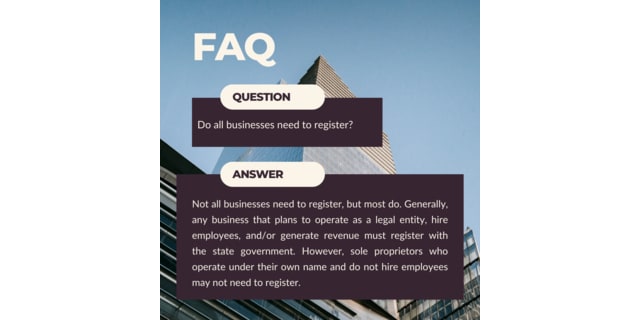Starting an LLC is a well-known way to protect your personal assets and enjoy the benefits of a structured business setup if you want to turn your passion into a profitable venture. However, it can be hard to know where to start.
This article will guide you through the process of how to start an LLC, from choosing a name to completing the necessary formalities, so that you can focus on growing your business with confidence. Let’s get started!
How to Start an LLC in 7 Simple Steps
Many small business owners choose how to start an LLC due to its liability protection. This is because an LLC functions as a distinct entity from its members, which means that the debts of the business are not the personal responsibility of the members.
To establish how to start an LLC, it is necessary to submit specific documents to the state where the business is located. Although each state has its own set of guidelines and procedures, there are basic steps that must be followed to establish an LLC, regardless of where the business is situated.
The following are steps on how to get an LLC.
Step 1: Choose and Reserve a Name for Your LLC
The use of the same name to open an LLC is prohibited for two different business entities in most states, regardless of their location. Furthermore, words such as “bank” may be banned from company names.
To avoid any problems when you open an LLC, it is advisable to verify the availability of your preferred LLC name online before submitting any paperwork.
To avoid legal issues related to trademark infringement when you open an LLC, it is recommended to not only comply with state laws but also conduct research to ensure that other businesses in your area are not using the same or similar names.
Choosing a distinctive name when you open an LLC can reduce confusion and potential legal disputes. Additionally, it is beneficial to check if a domain name matching your business name is accessible.
If you have selected an LLC name that’s not already taken, but you do not intend to register your LLC paperwork right away, you may consider reserving the name until you open an LLC.
Many states permit you to reserve a name for a particular timeframe by completing a form and paying a fee for the reservation. The length of the reservation period, fees, and renewal policies differ depending on the state.
Step 2: Choose a Registered Agent
To open an LLC, you’re required to have a registered agent or statutory agent in most states. The registered agent is responsible for accepting legal documents, subpoenas, and other authorized papers on behalf of the LLC and delivering them to the appropriate individual within the organization.
While certain states allow any person over the age of 18 who is a resident of the state, including members or officers of the LLC, to serve as a registered agent, companies like Northwest Registered Agent provide registered agent services for a fee.

Step 3: File Organization Paperwork with the State
Each state has its own set of requirements and procedures followed when you open an LLC and for setting up an LLC. In general, you will be required to provide articles of organization that contain specific information about the company.
- The company’s name and address
- The time frame of its existence (if not perpetual)
- Name and address of the registered agent
- The reason for creating the limited liability company
- The LLC organizer and, in some jurisdictions, the registered agent, must both sign the formation documents
If you’re wondering how to start an LLC, the general process entails submitting formation documents to the secretary of state in most states. However, it’s worth noting that some states might have a distinct department that manages business filings.
Nevertheless, regardless of where you’re based, LLC formation requires payment of a filing fee when you open an LLC. Do keep in mind, though, the exact cost on how to start an LLC will vary depending on which state you’re operating in.
Step 4: Prepare an LLC Operating Agreement
A careful consideration of how to start an LLC requires several important aspects, and one crucial element is creating an operating agreement.
This document provides a detailed roadmap for the company, outlining key areas such as distribution of ownership interests, member voting rights, profit and loss allocation, meeting protocols, governance structures, member rights in case of departure or death, and procedures for dissolving the company in case of a business closure.
In addition to the limitations imposed by state legislation, when you open an LLC, it is prudent to investigate whether or not other businesses operating in a similar industry in your region use names that are identical to or very similar to your own.
While contemplating how to start an LLC, note that picking a name that’s truly one of a kind is one of the best ways to steer clear of potential trademark infringement lawsuits. You should also think about whether or not a domain name that’s synonymous with your company’s name is available while planning to open an LLC.
Step 5: Determine the Licenses Needed
The operating agreement may not be required by law in the state where the business is located. Nonetheless, business owners learning how to start an LLC must make use of this document because it helps them define their roles and reduces the likelihood of disputes.
Step 6: Get an EIN
To move further, any entrepreneur wondering how to start an LLC should know that you must have an Employer Identification Number (EIN), which serves as your company’s equivalent of a Social Security number. The EIN is unique to your company and is necessary for a number of business obligations, including banking, taxes, and hiring employees.
Step 7: Register to Do Business in Other States (Optional)
If your LLC operates in more than one state, it is important to register in each state where you conduct business. The registration process involves submitting paperwork that’s similar to the paperwork filed when the how to start an LLC. Furthermore, you must have a registered agent in each state where your LLC is authorized to operate.
LLCs are a popular and flexible option for small business owners, and it’s relatively easy to start an LLC and maintain it in most states. However, it is essential to complete the paperwork accurately and have an operating agreement that outlines the responsibilities and duties of the members.
Important Steps to Follow After Forming an LLC
File Annual Reports
While it’s usually performed after one year of trading, it is advisable for any entrepreneur to learn on how to start an LLC to know this procedure beforehand. The yearly report or “statement of information” is vital as it furnishes the state with significant particulars about your enterprise, such as any modifications or revisions since your last filing period.

This data facilitates the state to inform you of any new legal obligations, including requisite permits. It’s suggested when you open an LLC that, you establish a mechanism for recording all your business dealings to prevent a last-minute rush for documents as deadlines loom.
What Should You Include in Your Annual Report?
To ensure completeness when providing information about your LLC, you should mention its name, office address, registered agent’s details (if applicable), and the number assigned by your state’s secretary on how to start an LLC.
It’s worth noting that each state has its own set of how to start an LLC laws and regulations, and the requirements for annual report inclusion may differ.
- The location of your primary residence
- Your managers’ and members’ names and addresses
- Your state entity number, as well as any other significant identification numbers
- The goal of your company
- An official signatory list
- Information regarding your registered agent
- Guidelines for submitting your annual report
Many states need you to file an annual report through the state’s official website in order to preserve your LLC. The cost of the procedure varies from state to state. For example, the price can range from $50 in Mississippi to $500 in Massachusetts.
What Happens if You Don’t File an Annual Report for Your LLC?
Failure to submit your yearly report on time is a major breach of protocol that can have far-reaching consequences. If your LLC fails to pay its taxes, fees, and penalties by the due date, it could be dissolved in several states.
Open a Business Bank Account
Although neither state nor federal law requires LLC owners to maintain a separate business checking account, doing so is highly recommended for a number of reasons.
- A separate business checking account is essential for maintaining your company’s limited liability status. By maintaining a wall of separation between your personal and corporate funds, you may better ensure that your privacy isn’t compromised. If you fail to do so, you may lose your protection from personal liability.
- Establishing a separate bank account just for your LLC demonstrates your company’s professionalism and legitimacy.
- It’s easier to get a handle on your financial condition if you keep your personal and professional finances separate.
- It’s advantageous to differentiate between personal and business-related expenses when submitting your yearly tax return. Keeping a record of your business expenses will help maintain a steady cash flow. This information can also assist your accountant in accurately categorizing your expenses.
>> Get Started With ZenBusiness >>
Obtain the Required Business Licenses and Permits
Even though some states do not require a business license on how to start an LLC, it is crucial to obtain one and any other necessary permits to ensure compliance with state regulations.
The requirements for licenses and permits may vary by state, so it’s important to check the SBA website to determine what is needed for your LLC’s state of registration. In most cases, it is possible to apply for these licenses and permits online.
License types:
- Health inspection certification
- Alarm permit
- Unemployment and worker’s compensation registration
- Sales tax registration
- Professional/occupational licenses
- General business license
- Weights and measures registration
How to Obtain Business Licenses and Permits?
To start the process of setting up your business, you should select the state, city, and county where you plan to operate. Then, you need to visit the website of the Small Business Administration to examine the regulations that are applicable to your specific location.
Make sure you have your Employer Identification Number (EIN) ready, which you can obtain from the Internal Revenue Service’s website if you don’t already have one. You can get your business code from any of the websites that offer this service.
Also, check if you require any permits in addition to the business license. Finally, keep a credit card handy to pay the filing fee, which can be anywhere from $50 to $500.
Learn More About Tax Requirements
It’s crucial to hire an experienced accountant who is familiar with managing LLCs and to educate oneself on tax obligations on how to start an LLC. The tax treatment of your business will depend on its structure, and you may choose to be taxed as a Sole Proprietorship (for LLCs with one member), Partnership (for LLCs with more than one member), or opt for S-Corp status.
Less knowledgeable general accountants may not be aware of legal tax reduction techniques that can only be implemented by experienced accountants. This can lead to clients missing out on potential savings in the long term.
Proper management of financial records and debit and credit bookkeeping practices can also help individuals and businesses minimize their expenses. It’s possible to reduce one’s bill by learning how to maintain proper debit and credit bookkeeping practices.
LLC Tax Filing Tips
To begin, it is crucial to determine and take advantage of all tax deductions and credits to which your LLC is entitled.
Second, you should always be aware of upcoming business tax deadlines and factor them into your planning accordingly. It’s also possible to submit taxes with the help of a professional accountant or tax consultant.
Last but not least, familiarity with state tax laws is essential. Your LLC’s tax forms will vary according to the following three criteria.
- If your Limited Liability Company (LLC) has one or more members
- If you decide to choose the default pass-through tax status, it is advisable to choose a corporate tax status for your LLC
- This is especially important if your LLC hires staff. No information should be left out when considering these factors
Get Business Insurance
Having insurance coverage is essential for businesses as it can protect them from unforeseen events such as water or fire damage, property damage, missed deadlines, and data breaches.
Besides these risks, there are other hazards like employee car accidents, slip-and-fall injuries, and work-related injuries that are typical in everyday business activities.
Moreover, some policies compensate for business interruption, legal expenses, and supply breakdown. It’s crucial to have insurance to safeguard a business from any potential harm.
Having “public liability insurance” is crucial in the event that a patron sustains injuries while on your business premises. Additionally, some states may require extra insurance for LLCs, while others allow you to choose.
Additionally, if you have employees, you must have workers’ compensation, unemployment, and disability insurance. By visiting your state’s website, you can ascertain your business’s particular insurance requirements.
Best LLC Formation Services
Entrepreneurs face many legal and administrative requirements when registering a business, making the process daunting and time-consuming. However, with the help of online LLC registration services, entrepreneurs can receive extensive assistance in starting and managing their businesses.
This article provides information on the top business registration services and tips for selecting the most appropriate service for specific business needs.
ZenBusiness

ZenBusiness is an online LLC service that specializes in helping small business owners, and entrepreneurs establish and grow their companies.
This LLC formation service provides a variety of affordable packages that include registered agent services, annual report filing, and other helpful features. Additionally, ZenBusiness offers ongoing support and resources to ensure that businesses are compliant and successful.
Swyft Filings

Swyft Filings is a business that specializes in aiding other businesses in the formation of LLCs, providing a range of services that address various aspects of LLCs, including incorporation, compliance, and registered agent services. Additionally, they provide tailored guidance to help businesses through the LLC formation process and ensure that they adhere to state and federal regulations.
>> Start Using Swyft Filings >>
Tailor Brands

Tailor Brands is a web-based tool that helps companies establish a consistent and professional brand identity. Their branding solutions feature logo and business card creation in addition to social media marketing. To help firms develop their own unique brand assets, they also provide a wide range of design tools and materials.
Northwest Registered Agent

Northwest Registered Agent is a company that offers customized support for a range of business needs, including registered agent services, compliance management, and document filing.
They specialize in LLC formation and provide ongoing assistance and resources to ensure that businesses remain compliant and grow. They’re a dependable partner for LLC formation services.
>> Form An LLC With Northwest Registered Agent >>
Incfile

Incfile provides LLC formation services that are affordable and fast. They offer registered agent services, document filing, and compliance management. Their platform is easy to use, ensuring a hassle-free process of how to start an LLC.
They also provide helpful resources to assist businesses in achieving success and staying compliant. Incfile is an excellent option for those seeking affordable and convenient LLC formation services.
Why Form an LLC?
Individuals and organizations who aspire to initiate a new business endeavor frequently opt for LLCs as a favored alternative for forming a business. Formation of how to start an LLC is favored for several reasons, including the establishment of a potentially successful business venture.
- Low startup cost: Establishing and running a Limited Liability Company (LLC) is often more cost-effective than incorporating a business. LLCs are a good choice for people who want to create an LLC but don’t want to spend a lot of money because the fees are often less than $100 in some states.
- Tax-related benefits: LLCs are unique in that they can be treated as pass-through entities, meaning that business income and losses are passed through to the owner personally while remaining separate from the owner’s other assets.
Due to its ability to avoid double taxation, this option is generally preferred by LLC owners. For tax purposes, however, LLCs can be treated as a sole proprietorship, partnership, C-corporation, or S-corporation.
- Liability shielding: One of the key advantages of having an open LLC is the protection it provides to its owners and members by limiting their liability. This means that if the company faces legal action, the personal assets of the members can be protected by correctly classifying the business assets.
Learning the steps of how to start an LLC isn’t difficult. There are businesses that offer help with annual tasks, including filing reports and fulfilling paperwork requirements.
Types of LLCs To Consider
In order to open an LLC, you need to be familiar with the various options available so that you may choose the one that best fits the nature of your business and the way you intend to manage it. A number of organizational forms for how to start an LLCs are available, such as:
-
- Single-member LLC: if you open an LLC with Only one person owns and manages the limited liability business (LLC). Despite having similarities to a sole proprietorship, this kind of an LLC provides additional benefits in terms of taxes and liability protection.
- Multi-member LLC: When you open an LLC (Limited Liability Companies) with Multiple-member, these LLCs are frequently classified as manager-managed or member-managed companies.
- L3C: With a major focus on the business case rather than earnings, “low-profit liability companies,” usually referred to as entities, act as a bridge between for-profit and non-profit LLCs.
- Series LLC: In a Series LLC, the parent company owns an endless number of subsidiary companies that each own a chain of. Each success of how to start an LLC is a self-contained entity with its own set of operations and resources.
- PLLC: The specialized LLC business formation is only available to licensed professionals and cannot be used by everyone.
- Restricted LLC: Such LLCs, which have restrictions imposed on them, are not subject to taxation during the first ten years of their establishment. Moreover, they’re not allowed to distribute funds to their members. The LLC’s articles of organization must explicitly state the restrictions placed on it.
LLCs that have undisclosed ownership are not officially categorized. They’re referred to as “anonymous” if their owner’s identity isn’t made public by the state where they’re registered.
Although deciding to open an LLC involves making much of the process public, some people may have a legitimate reason to keep their personal information private.
A single-member LLC whose business is run out of the owner’s house, for instance, would not want that fact to be widely known. Delaware, Nevada, New Mexico, and Wyoming are among the few states permitting people to open an LLC anonymously.
How to Start an LLC – Frequently Asked Questions
Should I Open an LLC for My Small Business?
The limited liability company is a popular form of business structure due to its flexibility and ease of use. It shields owners from personal liability for company debts and allows profits to pass through to them without immediate taxation. However, LLC owners must report their share of profits on their personal income tax returns.
Can I File for an LLC on My Own?
With the help of the free, comprehensive handbook on how to start an LLC tutorial, anyone may open an LLC (limited liability corporation) on their own. You could also use a third-party service, such as Swyft Filing or ZenBusiness, to incorporate your firm. The handbook contains all the information you’ll need to get started.
How Much Does it Cost to Start an LLC?
The price of creating an LLC varies according to the state filing fees and whether you want to do it yourself or use expert help. If you decide to engage with a third-party formation company, they might charge an extra fee of $40 to $350 for their services on top of the costs, which can range from $50 to $500.
Is it Possible to Set Up an LLC for Free?
If you want to open an LLC (limited liability company), you can either use a free guide called “How to Start an LLC” and do it yourself or get help from LLC providers such as ZenBusiness or Swyft Filing. It’s possible to open an LLC independently with the help of the guide, or you can hire the providers’ services to help you open an LLC.
Bottom Line on How to Start an LLC
On how to start an LLC business can often be intimidating, but there’s no need to fret. By following the steps provided in this article, you can proceed with confidence. Take things one step at a time and seek counsel from fellow business owners or refer back to this guide if you require assistance or advice.
Additionally, you may want to consider utilizing a service such as ZenBusiness to help you through the process. Keep in mind that assistance is readily accessible.
>> Use ZenBusiness To Start An LLC >>
This is a Partnered Post.


